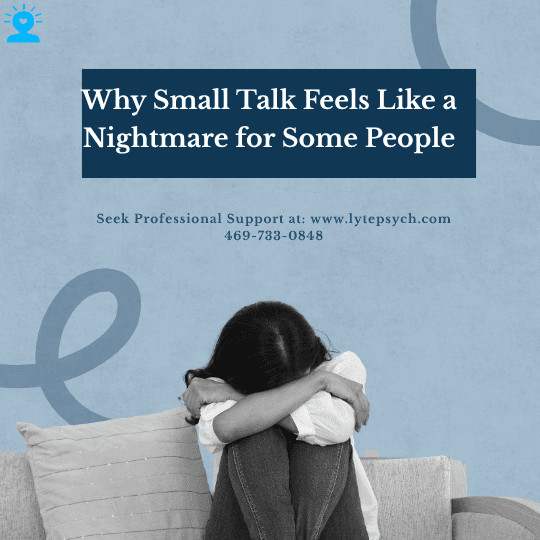120 E Grand Avenue #8 New Mexico 88101

Why Small Talk Feels Like a Nightmare for Some People at Lyte Psychiatry, Best Adults and Adolescents Therapist and Psychiatrist Near You (Affordable Therapist and Psychiatrist Near You) Dallas & Arlington, TX.
Mon Oct 27 2025
Why Small Talk Feels Like a Nightmare for Some People
At Lyte Psychiatry, Best Adults and Adolescents Therapist and Psychiatrist Near You (Affordable Therapist and Psychiatrist Near You) in Dallas & Arlington, TX
For many people, chatting about the weather, weekend plans, or work updates feels natural—even easy. But for others, small talk feels like a nightmare. The awkward silences, the pressure to “perform,” and the fear of judgment can turn casual conversation into a source of dread.
At Lyte Psychiatry, we understand that what seems simple for some can feel overwhelming for others. Whether you’re an adult or an adolescent, our psychiatrists and therapists in Dallas and Arlington, TX are here to help you understand why small talk is so hard—and how you can feel more comfortable in social situations.
Why Small Talk Can Be So Difficult
Neurodivergence (ADHD or Autism Spectrum): For individuals with ADHD or autism, reading social cues or staying engaged in small talk can feel exhausting or confusing.
Low Self-Esteem: When someone doubts their own worth, it can be hard to believe that what they have to say matters in casual conversations.
Past Negative Experiences: Embarrassing or awkward encounters in the past may make people hyper-aware or fearful of repeating them.
How This Impacts Daily Life
Social Skills Can Be Learned
While small talk may never feel “fun” for some people, it doesn’t have to feel like a nightmare. With the right support, individuals can learn skills to:
Reduce anxiety around social interactions
Practice conversation starters and responses
Recognize and challenge negative thought patterns
Build confidence in both casual and deeper conversations
How Lyte Psychiatry Helps
At Lyte Psychiatry, we provide evidence-based strategies for overcoming social struggles:
Therapy for Adults and Adolescents: including Cognitive Behavioral Therapy (CBT) to challenge anxious thoughts and build confidence
Social Skills Training: for those who feel stuck in awkward or anxious patterns
Medication Management: when anxiety or other conditions interfere significantly
Family Support & Education: to help loved ones understand and encourage healthy social growth
Affordable & Accessible Care: in Dallas and Arlington, so help is always within reach
Take the First Step With Lyte Psychiatry (Affordable Therapist and Psychiatrist Near You) Located In Dallas & Arlington, TX
If small talk feels overwhelming or you avoid social interactions out of fear or discomfort, you’re not alone—and you don’t have to keep struggling.
To see our services. Click Here
To schedule an appointment. Click Here
Call us if you have questions at 469-733-0848
Frequently Asked Questions:
Q: Does struggling with small talk always mean social anxiety?
A: Not always. Some people are introverted or neurodivergent and simply find small talk uncomfortable.
Q: Can therapy really help with something like small talk?
A: Yes. Therapy can provide practical tools and confidence-building strategies that make social interactions less stressful.
Q: Is it common for teenagers to feel this way?
A: Absolutely. Adolescents often feel self-conscious in social situations, and therapy can help them develop skills early on.
Q: Will I ever enjoy small talk?
A: Maybe, maybe not. But with support, you can make it less intimidating and more manageable.